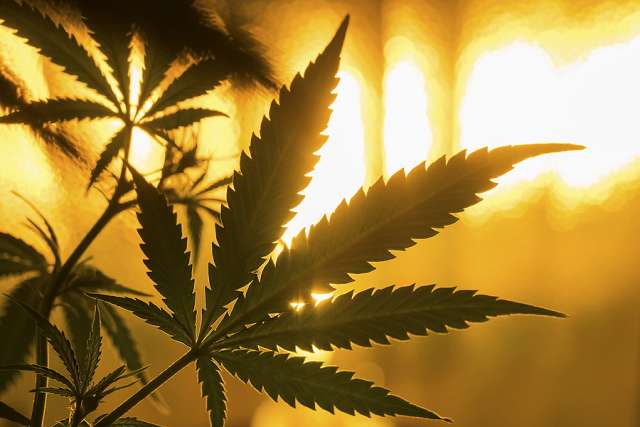Bishops Highlight Hazards of Pro-Marijuana Ballot Measures
With medicinal and recreational marijuana on the Election Day ballot in at least nine states, Church leaders are drawing attention to known harms associated with legalizing the drug.

Medicinal and recreational marijuana are on the Election Day ballot in at least nine states, and the Catholic bishops are devoting resources and speaking out in several public-awareness campaigns to defeat those initiatives.
The bishops are warning the faithful that legalizing marijuana sends a terrible message at the same time that the country is dealing with a national opioid epidemic, that it will lead more young people to use marijuana and become addicted to harder drugs, and create additional risks to public health and safety.
“We see things happening in Colorado and Washington that are going to be worse and amplified in California,” said Steve Pehanich, senior director of advocacy and education at the California Catholic Conference.
Pehanich told the Register that Proposition 64 — the ballot measure that proposes legalizing recreational marijuana in California — would encourage young people to smoke marijuana despite the documented risks of drug abuse and the anti-smoking awareness campaigns that have helped reduce regular tobacco smoking.
Said Pehanich, “You don’t want to encourage something that may have such repercussions later.”
While the California Catholic Conference, the official public policy arm of the Golden State’s bishops, has not staked out an official position on Proposition 64, several of the state’s individual bishops have condemned the measure in newspaper columns and prepared statements.
“The cost in lives is unacceptable. The parallels with other substances like tobacco are too striking. And the impact on our young people [is] too uncertain,” wrote Archbishop Salvatore Cordileone of San Francisco in Catholic San Francisco, the archdiocesan newspaper.
“Increased road fatalities alone should give us pause,” the archbishop also wrote. “Incredibly, California voters are being asked to allow the widespread use of marijuana despite the fact that, unlike alcohol, there is no reliable standard for measuring the effect marijuana has on a driver.”
Critics of the marijuana ballot initiatives note that pot-related traffic fatalities surged after Washington state legalized recreational pot in 2012, as a AAA study found that the percentage of adults in fatal car crashes who had THC — tetrahydrocannibinol, the active mind-altering chemical in marijuana — in their systems almost doubled after legalization.
“Experimenting with the health and welfare of our children, the potential impact on road safety, not to mention the medical and legal implications that are far from resolved, seem to me to take us in a dangerous and unwise direction,” Cardinal William Levada, the former archbishop of San Francisco and former prefect for the Vatican’s Congregation for the Doctrine of the Faith, wrote in a prepared statement.
The cannabis industry, led by groups such as the Marijuana Policy Project, has poured money into the effort in recent years, lobbying and getting legalization measures to voters. Four states — Washington, Alaska, Oregon and Colorado — and Washington, D.C., have decriminalized recreational marijuana, while 25 states permit medicinal marijuana.
On Nov. 8, initiatives to legalize recreational marijuana will go before voters in Arizona, California, Maine, Massachusetts and Nevada. Medicinal marijuana is on the ballot in Arkansas, Florida, Montana and North Dakota.
There is no defined, specific Catholic teaching on cannabis. But Scripture, the Catechism of the Catholic Church and other Church documents condemn drunkenness and recreational drug use that impair the mind and body. The Catechism of the Catholic Church, in 2291, describes the use of drugs, except on strictly therapeutic grounds, as a grave offense.
Despite the efforts of the Catholic bishops and other faith leaders, recent polling indicates the marijuana ballot measures may pass in several states.
Massachusetts
In Massachusetts, Question 4 would legalize recreational marijuana just four years after Bay State voters approved medicinal marijuana in a ballot measure. A coalition of 132 interfaith leaders have joined forces to defeat the proposed law, which they say was written “by and for the billion-dollar marijuana industry.”
“In the midst of an opioid epidemic, it is beyond reason that the commonwealth would commercialize the sale of marijuana,” the faith leaders said.
The leaders’ statement echoed an earlier response from Massachusetts’ Catholic bishops, who warned that marijuana represents a significant part of substance use in America and adversely affects the health of millions of Americans.
The Massachusetts bishops also noted a recent report from the National Institute of Drug Abuse that found marijuana is the most commonly used illicit drug in the United States and that the drug’s widespread use and abuse, particularly by young people under 18, is steadily increasing, while scientific evidence links its long-term damaging effects on brain development.
Cardinal Sean O’Malley, the archbishop of Boston, produced a series of videos with the Catholic TV network to illustrate Question 4’s shortcomings. The cardinal wrote on his blog that the Archdiocese of Boston has contributed $850,000 from Central Ministry funds to the Campaign for a Safe and Healthy Massachusetts to defeat the measure.
“The contribution is a reflection of how seriously we consider this issue, understanding that, if passed, this proposed law would have a significant detrimental impact on our parishes and our social outreach and support ministries,” wrote Cardinal O’Malley, adding that the archdiocese operates an extensive array of social services for the needy.
If Question 4 passes, the cardinal said, the archdiocese’s social services and the state’s poor residents will be harmed, as several studies indicate a substantial increase in the demand for emergency medical and counseling services in Colorado since that state legalized recreational pot in 2014.
Other Bishops Speak Out
The Catholic bishops of Arizona have also spoken out against Proposition 205, the ballot measure that would legalize recreational pot in that state. The Arizona bishops said the measure “sends a message to children and young people that drug use is socially and morally acceptable. As people of faith, we must speak out against this effort and the damaging effects its passage would have on the children and families of Arizona.”
The Arizona bishops also noted that various studies have shown that teens who use marijuana have significant differences in brain structure and cognitive functioning — experiencing up to an eight-point drop in IQ — as compared to those who do not use pot.
Said the Arizona bishops, “Furthermore, based on what happened in just two years after Colorado legalized marijuana, it is estimated that if Arizona passes this measure, tens of thousands of additional eighth-graders here will smoke marijuana for the first time.”
In Nevada, Bishop Joseph Pepe of Las Vegas and Bishop Randolph Calvo of Reno are also urging voters in their state to reject Ballot Question 2, arguing that legalizing recreational marijuana sends a message that drug use is socially and morally acceptable and warning that it will lead to increases in drug abuse by teens, emergency-room visits and traffic accidents.
“We believe that passage of Question 2 would have a negative effect on potential new businesses considering making Nevada their home, because of concerns recreational marijuana use would raise about the dependability of the workforce,” the bishops said.
Bishop Robert Deeley of Portland, Maine, said the recreational marijuana initiative in his state — Question 1 — would make it legal for children to possess marijuana, writing that that detail has been confirmed by Maine Attorney General Janet Mills.
“Legalizing a drug for recreational use that causes these effects on the human body, particularly our youth, is not a path that civil society should choose to take,” wrote Bishop Deeley, who added that Maine is “currently waging a losing battle against opioid abuse.” Opiate-related overdose deaths have skyrocketed this year in Maine, with 189 deaths in the first six months of this year, a 50% increase from the same period last year.
“Our attention must not be diverted from that health crisis, nor do we want to add fuel to the problem by increasing the number of marijuana users who might one day ‘graduate’ to other illegal/illicit substances,” Bishop Deeley said. “The legalization of marijuana can only serve to worsen this crisis.”
Register correspondent Brian Fraga writes from Fall River, Massachusetts.

















